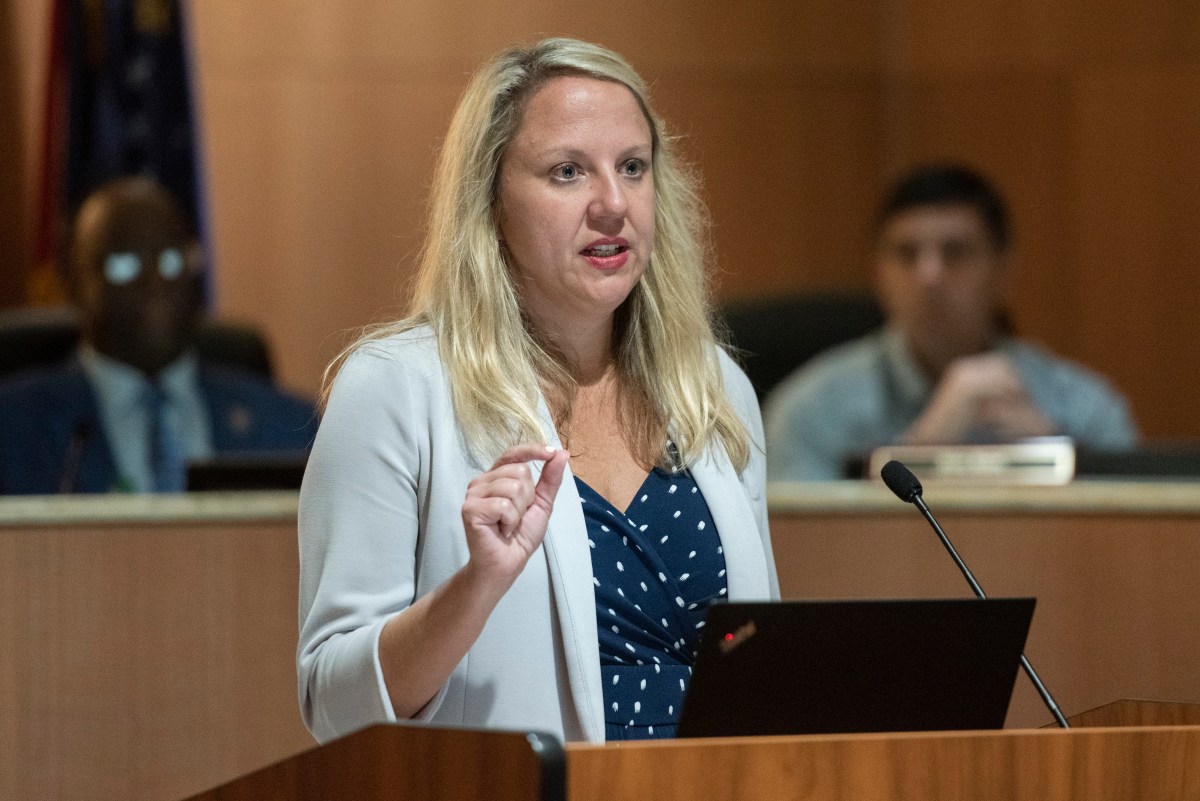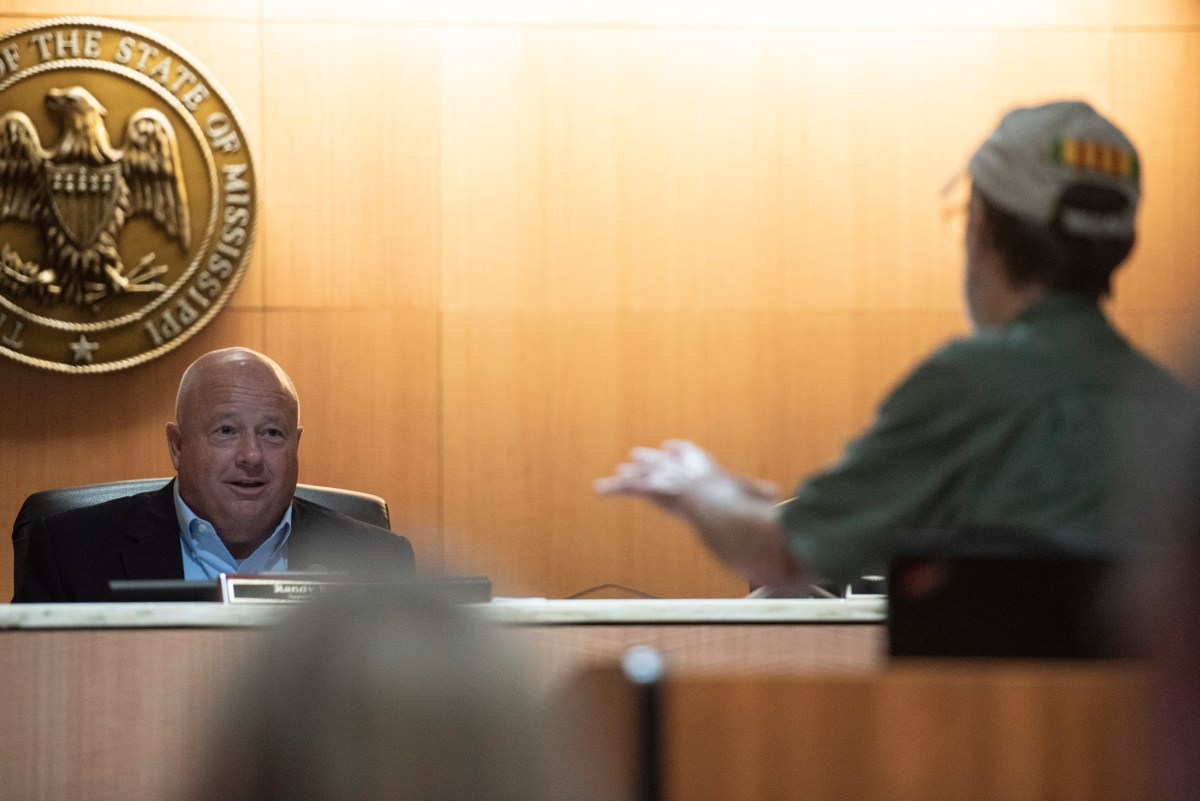Mississippi News
Sensing long-term challenges, Singing River seeks buyer
Singing River hospital is not on the brink of financial collapse. So why is it seeking a buyer?
Editor’s note: This story was reported and published in a collaboration between Mississippi Today and the Sun Herald. Isabelle Taft reported for Mississippi Today and Gautama Mehta reported for the Sun Herald.
JACKSON COUNTY – Unlike other Mississippi hospitals, Singing River Health System is not facing an immediate financial crisis – and that’s exactly why its leaders say they need to find a buyer.
The roughly 700-bed system, based in Jackson County on the Coast, came through the COVID-19 pandemic in decent shape, with revenue up in 2021. But the long-term forces buffeting Singing River and small hospitals around the country mean the future is still dark.
Costs are rising, especially for nursing staff. The hospital system needs to make improvements to facilities and equipment after years of underspending. Singing River has almost no leverage to increase payments from the state’s dominant commercial insurer, Blue Cross and Blue Shield of Mississippi. And in part because Mississippi has refused to expand Medicaid, a significant number of the system’s patients have no insurance, meaning Singing River doesn’t get paid for their care.
Hospital leaders say they need a bigger chain to take over so they can benefit from economies of scale and greater negotiating power with suppliers and insurers. If they wait until a crisis point, they’ll have less leverage and possibly fewer interested buyers.
“We’re coming at it now at a place of strength,” CEO Tiffany Murdock told a community group in the town of Hurley in August. “And in five years, I can’t promise you the same thing.”
It’s the latest demonstration of a trend with potentially troubling consequences for patients: In the world of American hospitals, only the huge survive.
From 2005 to 2017, the share of hospitals around the country that are part of a larger system rose from 53% to 66%.
In Mississippi, a 2017 merger made Baptist Memorial Health Care the largest hospital system in the state. The University of Mississippi Medical Center has expanded its footprint to Grenada, Holmes County, and the Gulf Coast and is bidding to lease hospitals in the Mississippi Delta. Rush Health Systems, which owns seven hospitals in east Mississippi and west Alabama, this year merged with Ochsner, the Louisiana-based system Singing River leaders see as their likely buyer. In 2019, Franciscan Missionaries of Our Lady, also based in Louisiana, acquired St. Dominic Memorial Hospital in Jackson.
State and locally owned hospitals like Singing River are a fading model. The American Hospital Association reports that, of the country’s 6,100 hospitals, about 950 are owned by local governments, down from 1,130 in 2008.
The potential downside of spending years trying to fight massive economic forces – and ending up in a much weaker negotiating position with a potential buyer – is clear enough in Mississippi. Hospitals like Greenwood Leflore are struggling to stay afloat long enough to find a savior or be forced to close their doors.
A growing body of research shows hospital consolidation usually increases costs for consumers by reducing competition. And despite hospital leaders’ claims about the resource benefits of joining a larger chain, research also suggests it doesn’t improve outcomes for patients.
“We know that consolidation is going to increase prices and potentially decrease access to care,” said Christopher Whaley, a health economist at RAND Corporation. “But if the alternative is that the hospital or physician group goes out of business and exits the market entirely, then maybe that’s a tradeoff we have to make.”

While small hospitals like Singing River look for buyers, bigger players like Ochsner – one of the biggest hospital systems in the Gulf South – have been looking for new acquisitions.
In 2020, Ochsner and Singing River announced a strategic partnership, and Singing River acquired Garden Park Medical Center in Harrison County, rebranding it as Singing River Gulfport. During Hurricane Ida, the partnership allowed Ochsner patients in hard-hit southeast Louisiana to move to the Gulfport hospital.
Corwin Harper, Ochsner CEO for Northshore and the Mississippi Gulf Coast, said expanding into Mississippi makes sense in part because so many Mississippians already use Louisiana health care facilities, and the states face similar issues with workforce recruitment.
“With Ochsner being the largest health system in Louisiana, it’s almost a natural migration for people to access the resources that Ochsner has,” he said.
Murdock, a registered nurse whose career in hospital administration has included stops in California and Oregon, was named the administrator of Singing River Gulfport. When former CEO Lee Bond stepped down earlier this year, Murdock was named interim CEO of the health system and then CEO. She is the first woman to hold the position.
In June, the hospital trustees voted to pursue a sale to a “like-minded hospital organization,” though Ochsner is generally the only name that comes up in Jackson County.
A report by the firm Raymond James found that while the hospital’s revenue had rebounded in 2021, rising expenses had cut margins. The hospital sees a high rate of uninsured patients, and federal payments to care for them are dropping. And as a small system, it has little opportunity to access loans or to increase cash flow by negotiating with insurers, since most of its patients are on Medicaid or Medicare and the commercial market is dominated by Blue Cross.
“It’s a nationwide issue,” Ryan Kelly, executive director of the Mississippi Rural Health Association, said of hospitals’ financial struggles. “But it is especially important here because we are a more poor state. Our hospitals are in the red, like on the verge of closure in a critical state, and it’s not because our hospitals are doing anything wrong or there’s anything wrong with Mississippi. It’s just because we’re a poor state and we have less money to go around.”
The pandemic also highlighted the benefits of scale.
“We were spending, you know, a nickel on a surgical mask five years ago when during the height of COVID, we’re spending $5 a mask and buying thousands of masks,” Murdock said at the community meeting in Hurley.
Ochsner, by contrast, built its own plant to make personal protective equipment in Lafayette.
But scale can come with a loss of local autonomy.
Ochsner also has a lease agreement with Hancock Medical Center on the Coast. In May, Ochsner closed the labor and delivery unit at the hospital, citing the low number of deliveries that made it hard to operate the unit safely. That left the county without a single labor and delivery unit and frustrated some Hancock County residents and leaders.
Over the summer, a Singing River retiree named Irby Tillman appeared poised to derail hospital executives’ plans.
Under Mississippi law, anyone can force a referendum on a public hospital sale by obtaining a petition with at least 1,500 signatures. Tillman, who worked as a carpenter at the hospital, was at one of the board of supervisors meetings where the sale was discussed. He heard an attorney say that the supervisors would make the decision – unless someone forced a referendum.
“I happened to be standing there and I said, ‘Well, I’ll take that challenge,’” he said. “I don’t think five men should have that big decision.”
But even if Tillman had never launched his petition drive, pursuing the sale would have required Singing River executives to embark on a kind of political campaign to persuade not only supervisors but also their constituents to support the sale.
The hospital is the second-largest employer in Jackson County with more than 3,500 employees. People all over the county remember births and deaths, emergencies and routine check-ups, first jobs and decades-long careers at Singing River.
Many of them also remember a profound betrayal: For years, the hospital secretly stopped paying into retirees’ pension fund before it collapsed in 2014. A settlement in a federal class-action lawsuit resulted in lower payments than retirees had been promised.
Murdock embarked on a county-wide speaking tour late this summer. She spoke at school district convocations and rotary club meetings, the chamber of commerce and churches, trying to convince people to support the sale.
At a special meeting for pensioners, Murdock assured them the sale would not affect the pension settlement.
Meanwhile, Tillman traveled the county, too. In late August, he and his cousin Paul Wise, also 73 and a Singing River retiree, spent several hours outside Ixtapa, a Mexican restaurant in Vancleave. They both grew up in Pascagoula, two of their grandmother’s 75 grandchildren. Wise was leaning toward supporting the sale, while Tillman was leaning against it.

Tillman prided himself on never saying a word about how he thought anyone should vote, only emphasizing the importance of having a say in the process. The men carried a handmade poster that said “Let your voice be heard” and was decorated with small American flags. Everyone they talked to wanted to see a referendum.
All five supervisors and even Murdock signed the petition.
“If I didn’t sign, I didn’t want (that) to get in the way of the goal, which is to move this forward,” she said. “And so I didn’t want that to be the headline. I wanted the headline to be like, ‘This is the right thing to do, whether there’s a petition or not.’”
But she was wary of what a referendum could mean.
Mississippi Today could locate only one such referendum in state history. Oktibbeha County voters roundly rejected a proposal to sell OCH Regional Medical Center in 2017. If that happened in Jackson County, Singing River leaders said the county would have to raise taxes and still be unable to cover rising costs.
In the end, Tillman did not gather enough signatures to require a referendum. It rained heavily in the weeks before the deadline to turn in the petition, and Tillman relied on old fashioned methods to obtain signatures.
“Water and ink don’t go together too good,” he said.
And after months of discussion, showing up to board of supervisors meetings and public hearings, he was leaning toward supporting the sale anyway, he said.

The Jackson County Board of Supervisors doesn’t yet have a specific timeline for when the request for proposals will be finalized and buyers can begin submitting bids.
The potential buyer frequently mentioned by name in Jackson County is Ochsner. But other hospital chains could make a move, too.
The Franciscan Missionaries of Our Lady Health System (FMOLHS), which operates St. Dominic Memorial Hospital in Jackson and hospitals in Louisiana, said in a statement that it is “aware” that an RFP has been issued.
“FMOLHS regularly evaluates opportunities to expand access to care by partnering with quality health systems to bring together outstanding clinicians, the most advanced technology and leading research to ensure that our patients receive the highest quality and safest care possible,” said Kevin Cook, chief operating officer.
The sale will leave Mississippi with one less locally owned hospital, and it may be an indication of the future facing every small hospital in the state.
Richard Roberson, general counsel and vice president of policy at the Mississippi Hospital Association, said Singing River’s situation highlights the structural forces working against Mississippi hospitals.
“I think that is what’s scary about it – you do see a hospital that is a strong hospital, a strong health system, and as good as they do things, they’re still struggling,” Roberson said.
This article first appeared on Mississippi Today and is republished here under a Creative Commons license.
Mississippi News
Events happening this weekend in Mississippi: April 25-27
SUMMARY: This weekend in Mississippi (April 25-27) features a variety of events across Central and Pine Belt regions. Highlights include MiraGotSoul at Vibe Studio in Jackson, a community Dinner and Movie in Clinton, and the Natchez Kite Festival. Enjoy live performances with Sweet Lizzy Project in Natchez and the New Bourbon Street Jazz Band in Clinton. Family-friendly activities include the Native Plant Fest and Community Farmers Market in Jackson. In Hattiesburg, catch the Henry Cho tour and the Downtown Crawfish Jam Music Festival. Overall, it’s a weekend full of entertainment, culture, and fun activities for all ages.
The post Events happening this weekend in Mississippi: April 25-27 appeared first on www.wjtv.com
Mississippi News
Events happening this weekend in Mississippi: April 18-20
SUMMARY: This weekend (April 18-20), Mississippi offers a variety of events for all ages. In Jackson, enjoy Food Truck Friday, a jazz concert, free outdoor movie screenings, and multiple exhibitions including “Of Salt and Spirit” and “Hurricane Katrina: Mississippi Remembers.” For family fun, there’s an Easter Egg Hunt at the Ag Museum and “Bunnies & Butterflies” at MCM. Natchez features the Spring Pilgrimage, Lafayette’s 200th anniversary celebration, and a farmers market. In the Pine Belt, highlights include Live at Five, a Spring Candle-Making Workshop, and Easter events at the Hattiesburg Zoo. Don’t miss the Bluff City Block Party and more!
The post Events happening this weekend in Mississippi: April 18-20 appeared first on www.wjtv.com
Mississippi News
Events happening this weekend in Mississippi: April 11-13
SUMMARY: This weekend in Mississippi (April 11-13), enjoy a variety of events across the state. Highlights include the Eudora Welty Birthday Bash in Jackson, Trivia Night at the Mississippi Museum of Natural Science, and Boots & Bling Fundraiser in Natchez. For family fun, check out the Bunny Bonanza in Jackson or the Easter Egg Hunt in Clinton. The Natchez Concours d’Elegance Car Show and Stranger Than Fiction Film Festival offer cultural experiences, while the 12th Annual Dragon Boat Regatta in Ridgeland and the Hub City Classic Car Show in Hattiesburg provide exciting activities for all ages.
The post Events happening this weekend in Mississippi: April 11-13 appeared first on www.wjtv.com
-

 SuperTalk FM7 days ago
SuperTalk FM7 days agoNew Amazon dock operations facility to bring 1,000 jobs to Marshall County
-

 News from the South - Missouri News Feed3 days ago
News from the South - Missouri News Feed3 days agoMissouri lawmakers on the cusp of legalizing housing discrimination
-

 News from the South - Florida News Feed7 days ago
News from the South - Florida News Feed7 days agoTrump touts manufacturing while undercutting state efforts to help factories
-

 Mississippi Today2 days ago
Mississippi Today2 days agoDerrick Simmons: Monday’s Confederate Memorial Day recognition is awful for Mississippians
-

 News from the South - Florida News Feed7 days ago
News from the South - Florida News Feed7 days agoFederal report due on Lumbee Tribe of North Carolina’s path to recognition as a tribal nation
-

 News from the South - Oklahoma News Feed7 days ago
News from the South - Oklahoma News Feed7 days agoOklahoma Treasurer’s Office Faces Scrutiny Over Use of Signal in Anti-ESG Coordination
-

 Mississippi Today5 days ago
Mississippi Today5 days agoStruggling water, sewer systems impose ‘astronomic’ rate hikes
-

 News from the South - Georgia News Feed7 days ago
News from the South - Georgia News Feed7 days agoOrganization files ethics complaint against Warnock | Georgia













































